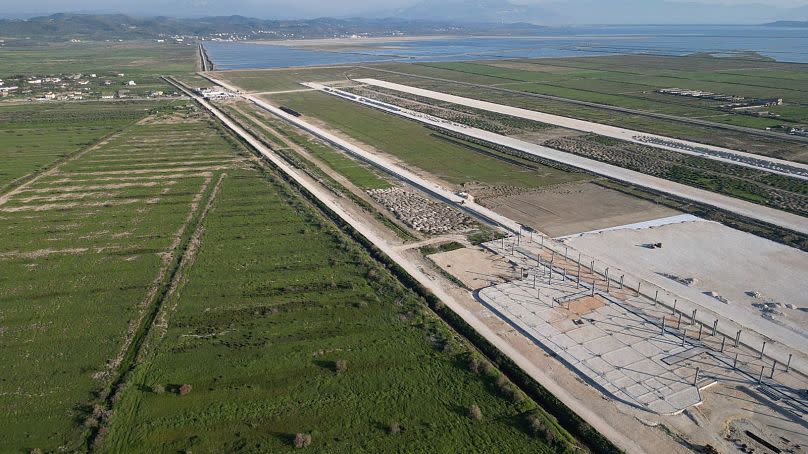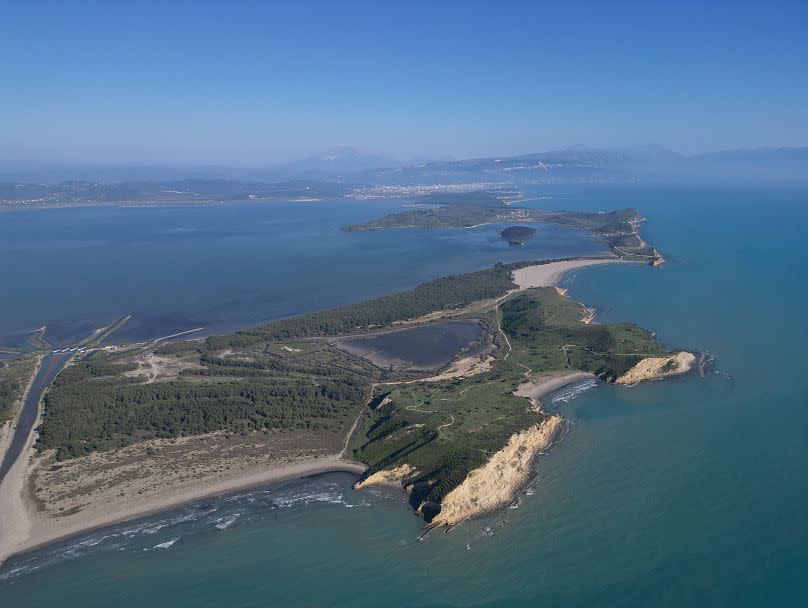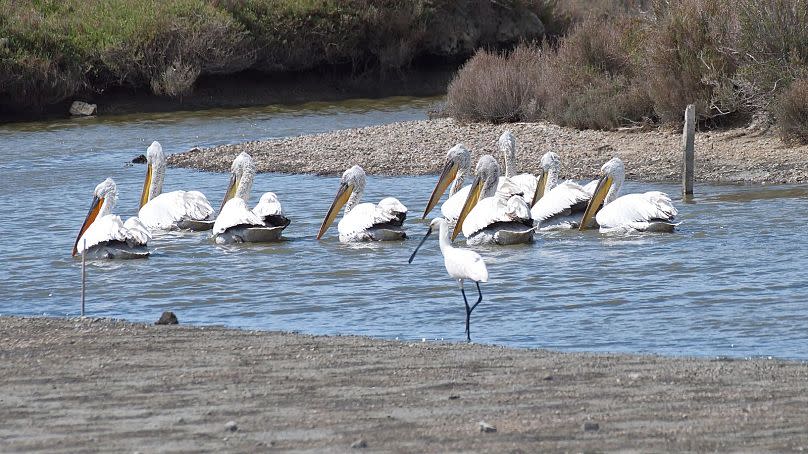Why is Trump’s son-in-law allowed to build in Europe’s first wild river national park delta?

- Oops!Something went wrong.Please try again later.
Joni Vorpsi was protesting outside the Albanian Parliament when he heard the draft law he was there to stop had passed.
Law 21/2024, as it’s officially known, is a nightmare for environmentalists as it enables the construction of five-star mega resorts anywhere in the country - including protected natural areas.
Its approval came in February, three days after Donald Trump’s son-in-law Jared Kushner went public with his plans to create two resorts by the Vjosa River delta, an ecologically priceless wetland.
“It was devastating,” says Vorpsi, a project manager at the Protection and Preservation of Natural Environment in Albania (PPNEA) NGO. “It's the biggest attack on Albanian nature since the 90s,” he adds, looking back to a dark chapter in his nation’s history when “people couldn’t see nature as something to preserve.”
This country has become the first in modern history to lose all of its glaciers
Jellyfish could be one marine creature that benefits from climate change
Today, Albania appears to have recognised the value of its natural assets. More than 21 per cent of the country’s total landmass is within a network of protected areas, the Ministry of Tourism and Environment says. It won international plaudits for making the Vjosa Europe’s first wild river National Park last year after bowing to pressure from a prolonged campaign by activists.
But the protection did not stretch to the delta, something which alarmed PPNEA since this coastal wetland is the most biodiverse part of the waterway, home to Dalmatian pelicans, endangered water frogs, flamingos, spoonbills and loggerhead turtles.
Underneath the current of positivity, environmentalists say there is a clear pattern of nature being sacrificed to development, as the government looks to realise its vision of an Albanian riviera.
‘Everything is connected’: The airport by the lagoon

Nearby where Kushner is eyeing up developments - on the Zvërnec peninsula and Savan island - lies the construction site for a new airport, begun in 2022.
Vlora International Airport is being built on the edge of the 40 kilometres squared Vjosa-Nartë Lagoon, a key stopover for migrating birds that has been protected for 20 years.
But the government redrew the boundaries of this nature reserve (among others), meaning the airport site fell outside of the protected area and was then given a construction permit. PPNEA is involved in two ongoing lawsuits over these steps.
The EU (which Albania aims to join) has said the airport contradicts both national laws and international biodiversity protection conventions that Albania has ratified. The Committee of the Bern Convention tells Euronews it is following the situation closely, after its call to suspend construction was ignored.
For environmentalists, the airport is the start of a slippery slope. “If they start saying that we are building the airport in protected areas because it's for the public interest, then they will start doing it in all the protected areas with resorts,” Vorpsi says.
He claims that the Vjosa wild river national park designation is being used by the Albanian government to portray themselves as protectors of nature.
A government spokesperson tells Euronews Green that, “The airport project isn't emerging from nothing; rather, it's evolving in an area where the previous airport operated until the early 1970s. This location falls outside the protected areas system and has no impact on Natural Monuments such as the Narta Dunes, the Zvernec Forest, and the Narta Lagoon.”
The Albanian law change that enables construction in protected areas
Under the change to Albania’s law on protected areas, the National Territory Council can award permits for luxury tourist resorts anywhere in the country.
MPs submitted the draft law in November, and it was sped through in February, despite the EU requesting the government to suspend voting and make the process more transparent.
The delegation of the EU to Albania - a diplomatic mission which guides the country towards integration with the bloc - said in response that it will be following the implementation of the new legal provisions “very closely.”
For Vorpsi, that doesn’t go nearly far enough. He describes the significance of Law 21/2024 in much stronger words: “we realise that now things have changed forever. Now we will be in a constant war.”
Where five-star resorts are permitted, he foresees a much wider sprawl of infrastructure - from highways and bridges to new power plants and golf courses.
The Kushner-backed projects in Albanian nature
Vorpsi didn’t know who Kushner was when he first heard about his designs on Albania. But he can see the attraction: “it's like kilometres of virgin coastline, which every investor would be happy to have.”
Kushner’s Miami-based private equity firm Affinity Partners is on the verge of investing in new tourist developments along this stretch of southern Albania.
Photos shared to his Facebook page show early design images for the resorts on uninhabited Sazan island - a speed boat ride from Vlora airport site - and the Zvërnec peninsula, connected by a wooden bridge to an island in the Nartë lagoon. Affinity Partners, with a pot filled by the Saudi Arabia Public Investment Fund, has also just got the green light to build a $500 million (€461 mn) hotel complex in Serbia, prompting local protest.
According to the Ministry of Tourism and Environment, Albania is still “at a very early stage’’ with the Sazan island application, which has been received by the Albanian Investment Development Agency but has to go through several levels of review. Officially, the government has not yet received an application for the project in the Narta area, it adds.
Sazan is in the Karaburun-Sazan national marine park, and Zvërnec is inside the Pishë Poro-Nartë protected area, but the ministry contests that Sazan is a protected area.

Kushner’s plan for Zvërnec reportedly includes up to 10,000 ‘units of villas’. With a minimum of two to a room, Vorpsi fears a deluge of 20,000 tourists and their needs will effectively give rise to a “new luxury city”. Some of the infrastructure required will be supplied by the government, as part of its offer to ‘strategic investors’.
“When you start putting all the pieces in the puzzle, you don't feel very much surprised that there is this big name,” says Vorpsi. But he fears the Trump-related name has been a distraction to the press and public, prompting political rather than environmental discussion.
Locals are divided over the developments, with some viewing them as an economic opportunity. There is a shallow-rooted attachment to the land in villages that were only created during the 1970s, Vorpsi explains, when lagoons were drained for agriculture.
“But still people have started to understand, there is a lot of public rage,” he adds.
How will the developments impact biodiversity in the Vjosa delta?
The airport, the law change, the Kushner projects: “all this is a vision” Vorpsi says, which makes it impossible to talk in detail about the species which will be disturbed or lost.
“We are losing the coastal wetlands once and forever because of this vision,” PPNEA’s pelican conservation coordinator says. “We don’t talk at all about biodiversity presence there, in the end [...] it will be vanished.”

People are at risk of losing their natural resources too if the hydrology of the lagoon area and its underwater rivers are wrecked. And since this coastal wetland provides a vital buffer against flooding and sea-level rise, “big catastrophes” could follow, he warns.
Spanning 240 square kilometres as it empties into the Adriatic, the Vjosa Delta is one of the vanishingly few intact deltas in the Mediterranean Basin.
Scientists undertook a data-gathering mission at the site last month. “Our first findings reveal the enormous ecological value of the delta,” says Austrian lead scientist Prof Fritz Schiemer. “Amidst the allure of luxury tourism, we must remember the unparalleled ecological importance of the Vjosa Delta, a treasure unique in all of Europe.”
Environmental NGO Euronatur and others involved in the science delegation are urging the government to include the delta in the Vjosa Wild River National Park. But Vorpsi says this wouldn’t safeguard it from development given the new law.
How are environmental campaigners fighting back?
PPNEA is instead channelling its energy into rallying the public, and fighting the government through legal means. One of its lawsuits against the construction permit for Vlora airport, submitted almost two years ago, is now back in the Court of Appeal.
Campaigners feel that the authorities are “waiting until the airport is more advanced and they will say that it's a done fact now,” says Vorpsi.
In the meantime, the delta appears to be fighting back in its own way. Layers and layers of gravel are having to be laid down, each sinking into the mudflat, he says, before the asphalt can go on the runway. The airport opening has been delayed until next year.
In a statement, the Ministry of Tourism and Environment emphasises that, “Albania aims for high-end tourism, as a measure to protect the environment through sustainable tourism and not mass tourism.”
“It's crucial to recognise that protected areas and human communities are not separate entities; they can coexist harmoniously as they did historically,” the ministry spokesperson adds.
“These areas shouldn't be viewed as static reserves or isolated zones akin to zoos, displacing inhabitants from their ancestral homes. The new legislation on protected areas ensures their holistic preservation and integrity.”
Affinity Partners did not respond to a request for comment about its potential investments in Albania, and their impact on the environment.

